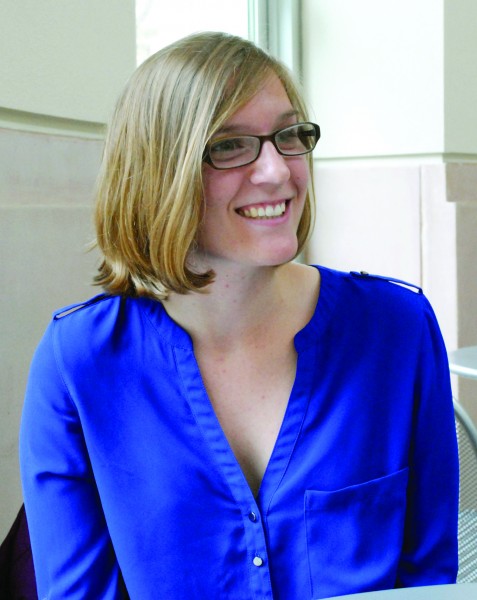When Aubrey Shaw was 6 months old, she went flying through the air. Still strapped to her car seat, she was ejected from her family”s car when a semi-truck collided with it.
Soon after, paramedics found her on the side of the road. She was airlifted to Denver, Colorado, where she underwent surgery to repair a two-inch tear in her brain. Her mother, Debra, remained at a hospital in Wyoming where the crash occurred.
“That was really rough on us because we were all separated from each other,” Debra said. “They did say that they were not sure that she would be able to walk or she might need a walker. They weren”t sure she would be able to speak or speak very clearly.”
Now, Aubrey”s left side is stronger than her right. She has an abnormal gait and her right wrist sits at an atypical angle. She may have to read things a few extra times – and on May 14, she will earn her second college degree.
“My story is my story, but it doesn”t define who I am,” Aubrey said. “I wake up in the morning and I say, “Let”s go.””
She began her undergraduate studies at the University of Hawaii before transferring to UI and graduating with a bachelor”s degree in psychology. Aubrey is preparing to graduate with a master”s degree in movement and leisure sciences. Then, she will continue studies at UI for a doctorate.
In Hawaii, she said people would look at her differently. When she told her mom, Debra said it was because they noticed. Aubrey said her response was, “Notice what? Nothing is wrong.”
Sharon Stoll, professor in the department of movement sciences, said she noticed Aubrey”s disability because a family member has a similar physical manifestation of a traumatic brain injury.
Stoll said she encouraged Aubrey to continue on for her doctorate after having her in classes and hearing her story. For one assignment, she said Aubrey wrote a paper on her love of sports.
“She was always separated out, and that separation out is not a good thing, because young people who have these injuries or limitations or whatnot want to play,” Stoll said. “When I read that, I thought “Wow, what a voice. What a voice to make a difference.””
Stoll said she sees a future for Aubrey being an advocate in the field of movement sciences for treatment and perception of people with disabilities.
“In my eyes, my disability is invisible,” Aubrey said. “If you”re looking for it, you can see it.”
However, Stoll said she”s had debates with Aubrey for quite some time about the visibility of her disability.
“We”ve had this argument going on forever,” Stoll said. “The whole point of being a voice is to know that you have it.”
Debra said she has seen Aubrey do a bit more self-reflection, especially since she began at UI. As the youngest child in the family, Aubrey said she was expected to keep up with her sisters.
“We made her do what her sisters did and she wanted to do that “¦ She wanted to keep up with her sisters,” Debra said. “We just treated her like we treated the other girls, our other daughters, and they treated her like they treated each other.”
Debra said she and her husband raised all their children with the same philosophy – work hard, do what you need to do and try your best.
“I was raised as if nothing ever happened,” Aubrey said.
Debra said when Aubrey”s sisters were studying she studied, too.
“When I was a kid, I didn”t want to do it,” Aubrey said. “As I got older, I understood what they were saying.”
Although Aubrey said she never wanted to do her schoolwork, especially not math, she fell in love with psychology and helping others.
“She”s a charming person, she”s very bright and hard-working, but she had to work herself there,” Stoll said.
Debra said attending college was something Aubrey had wanted since she was about 7 years old. She said they visited the University of Minnesota and had to push buttons and wait for a walk signal to cross streets on campus – something foreign to their small hometown.
Debra said Aubrey looked at her and said, “Oh my gosh this is so cool, I can”t wait to go to college.”
“We are so proud, so proud of her, because school was a struggle for her, but it”s something she never gave up on,” Debra said.
Aubrey is one of more than 200 UI students to use the Disability Support Services office on campus.
Aarika Dobbins, assistive technology specialist, said there is a wide range of options available for students with disabilities, including note-takers, proctored test with time extensions and class caption writers. Aubrey said she uses the note taking service and extended time for exams.
“It”s nice to know you can have someone in the class getting the notes if you miss something,” Aubrey said.
She said she usually assesses class the first day and then decides if she will need help with notes.
“I know that someone else some place else might need that,” Aubrey said of the note-taking service.
Aubrey said that over her lifetime, including her time as a student athlete through her high school years, she has not struggled with how people perceive her.
“If there was a perception issue, I was never aware of it,” she said.
Katelyn Hilsenbeck can be reached at [email protected] or on Twitter @Katelyn_mh
